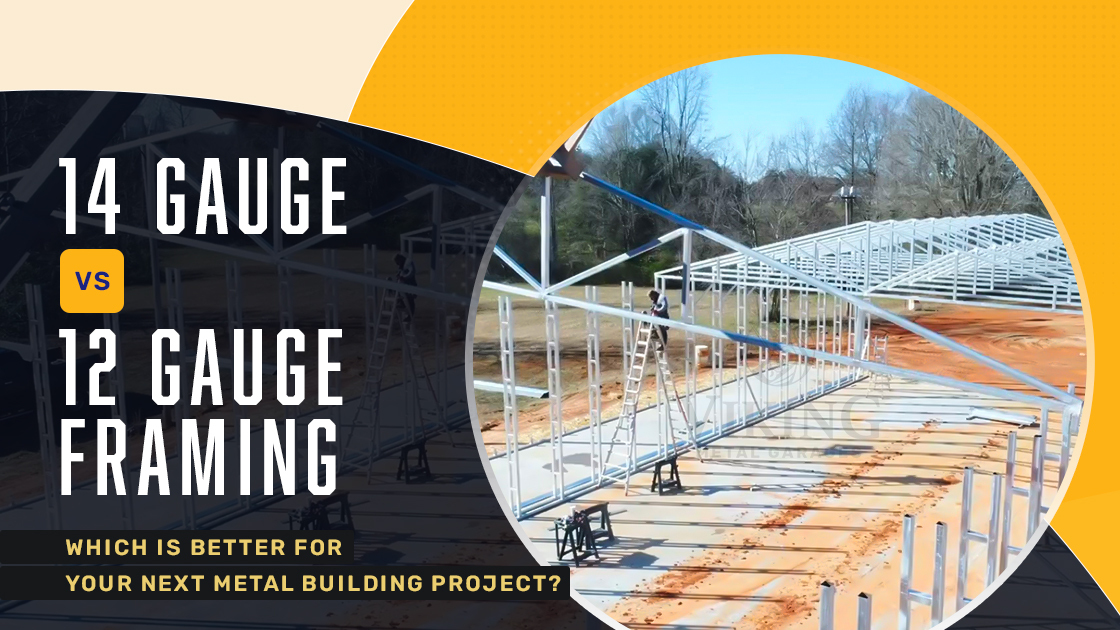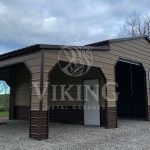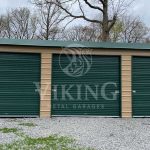14 Gauge Vs. 12 Gauge Framing – Which is better for Your Next Metal Building Project?
May 18, 2020
Metal buildings are a new approach to support nature and promote green buildings. Gone are days when steel structures were only limited to residential purposes. With its increasing exposure, metal garage buildings are being used for a wide range of personal and professional needs. All prefabricated steel garages are delivered and installed with 100% galvanized steel resistant to pests, rust, and other seasonal problems common with conventional wood buildings.
Installing a modern metal garage requires the selection of correct steel framing where manufacturers provide 14-ga and 12-ga. Before checkout, you must know detailed knowledge about steel gauge, why it’s essential, and how you can choose the right one among two.
Why is Galvanized Steel Such A Perfect Fit?
Galvanizing is a process of applying a zinc coating to steel sheets. The method of HDP (Hot Dip Galvanizing) is used to apply zinc coating on steel. Liquid zinc applied to steel, bonds with its body, and builds a protective layer that resists frequent peeling-off problems, rust, and other metal related issues. Moreover, the galvanization process is economical compared to regular painting and other options.
What is a Steel Gauge?
Steel Gauge is the thickness of a metal sheet that is commonly considered while ordering a metal building. With an increase in gauge number, steel thickness decreases. In short, the thickness is inversely related to gauge numbers.
Gauges for steel are based on a weight of 41.82 pounds per square foot per inch of thickness. For metal buildings, manufacturers provide 12-gauge and 14-gauge options. 12-gauge is thicker than 14-gauge. 12-gauge steel sheets have a thickness of 0.1084 inches, whereas a 14 gauge metal sheet is 0.0785 inches thick. The 14-gauge tubular frame has 2 ½” x 2 ½” steel tubing, whereas 12 gauge – 2 ¼” x 2 ¼” steel tubing. Remember, both gauges (12-ga and 14-ga) are safe for installing of metal carports, workshops, commercial buildings, and custom metal garages.
Galvanized Steel Gauge Chart*
| Gauge Number | Inches | MM |
| 8 | .1681 | 4.269 |
| 9 | .1532 | 3.891 |
| 10 | .1382 | 3.510 |
| 11 | .1233 | 3.1318 |
| 12 | .1084 | 2.753 |
| 14 | .0785 | 1.9939 |
| 16 | .0635 | 1.6129 |
| 18 | .0516 | 1.310 |
| 20 | .0396 | 1.005 |
| 22 | .0336 | .853 |
| 24 | .0276 | .701 |
| 26 | .0217 | .551 |
| 28 | .0187 | .474 |
| 30 | .0157 | .398 |
*Actual thickness will vary due to tolerances.
Difference between Regular Steel and Galvanized Steel
Galvanized steel is regular steel that is applied with zinc coating to resist rust and corrosion. As metal workshops are made to last long, it’s essential to ensure the steel is capable of confronting rust, corrosion, and decay. Galvanisation omits these problems in steel, which makes it top building material.
Regular steel is susceptible to rust, which degrades building a life as well as requires frequent painting to extend its life. This way, woods will be a better option over traditional steel buildings. Hence steels are galvanized with zinc that add-on a protective layer for add-on life. So, you can utilize a building for decades to come, without worrying about its damage and high maintenance costs.
Which Steel Gauge Framing is Right for You?
Already mentioned, 12-gauge steel is better than 14-gauge steel. Whenever you order a standard metal garage building, manufacturers deliver 14-gauge buildings at your property. However, to order a certified metal garage, you need to ask for 12-gauge steel. Remember, ordering a 12-gauge steel framing for your garage building will include an up-charge based on your area and building dimensions. Compared to 14-gauge steel framing, 12-gauge has multiple traits that include:
- 12-ga is 30% thicker and robust.
- 12-ga has a 20-year rust warranty.
- It is highly-recommended if you are in an area that gets heavy snowfall.
So, if you want a studier and certified steel garage that can sustain adverse weather conditions like storm, heavy snowfall, rainfall, and high winds, you should undoubtedly choose 12-gauge steel.
Want to Know more about 12-Gauge Steel
In case you still encounter any doubt associated with 12-gauge steel, better to call our metal garage experts at (704)-741-1587 and get answers to your entire queries. Our friendly & professional team of building experts can assist you in every possible way.

